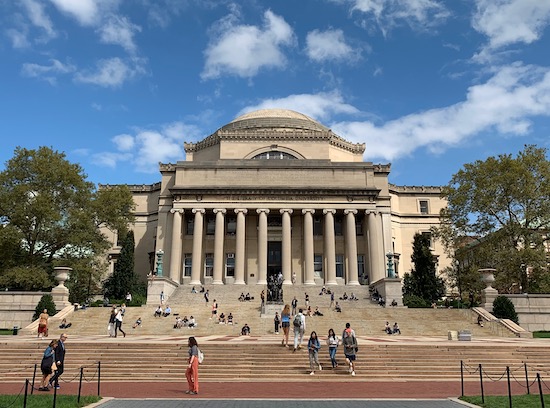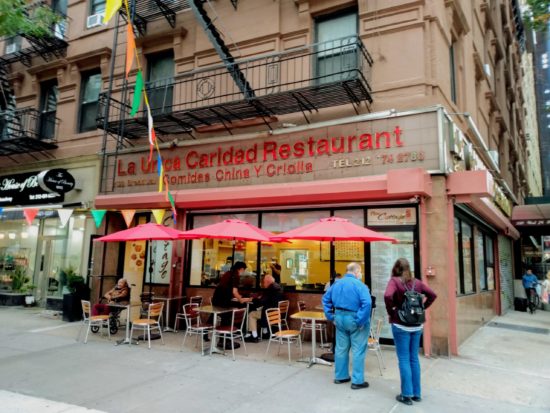By Fernanda Martinez
A change in how graduate students are paid is the latest point of tension in an ongoing struggle between Columbia University and the union representing graduate students who work there — and it could lead to a strike.
Nearly 90% of the 2,000 members of the Student Workers of Columbia (SWC-UAW Local 2110) voted in favor of declaring a strike against the university. Among their demands are fair compensation, healthcare, and protections against sexual harassment and discrimination. The union, which was recognized by the university in 2018 after years of pressure and organizing by graduate students, also held a strike that lasted several weeks in the Spring. A contract that the union negotiated with the university was narrowly voted down by union membership earlier this year.
The strike was precipitated by the change in payment schedules, which impacted Teaching Fellows, Preceptors, and Research Fellows in certain schools. Johannah King-Slutzky, a Union spokesperson, told WSR that students “are ready to mobilize unless Columbia makes major concessions.”
Graduate students at Columbia have gotten paid in different ways based on what school they attend. In the past, Columbia paid some of them two-thirds of their yearly stipends at the beginning of the academic year, which helped students cover moving costs, rent deposits, and even help heads of households pay for childcare. The rest of their compensation arrived in semi-monthly installments throughout the semester.
Weeks before the start of the Fall semester, Columbia informed graduate student workers that there would be a change in their payment schedule. According to a document signed by the Vice Presidents of Student Financial Services and Human Resources “this year, the stipend portion of the payment will commence with a lump sum payment of $2,600.”
The memo also notes that the remainder of the stipend will continue to be paid semi-monthly over the fall term, and that “the amount of total support and [financial] compensation will not be affected in any way.”
Graduate student workers, however, say that this reduction in initial payment, which for some represents a difference of up to $8,000 compared to last year, has forced them to go into debt or apply for food stamps. This is especially true for international students and parents, whose cost of living is generally higher.
Cameron, a PhD candidate who asked to withhold his last name citing privacy concerns, told WSR of the challenges faced by his own family. “The scheduling of the pay really affects how much cash we have on hand, and what we are able to do,” he said. With the $2,600 lump sum that the university disbursed around Labor Day, “we could pay September’s rent or we could pay for childcare,” he continued.
Cameron, who also lives in university graduate student housing with his family, estimates that at least two-thirds of his income eventually returns to the university in the form of rent. Citing financial concerns, he reached out to University Housing, and they agreed to accept a one-time late payment for rent.
The initial memo sent out by Columbia explained that the change in schedule “aims to more closely align with how other graduate students receive compensation.” It also encourages students who might be experiencing financial hardship to contact their financial aid office.
To some students who reached out, Columbia offered interest-free loans. Cameron was one of them, and his family received $2,000, all of which he’ll have to pay back by November. “I have to pay back or I can’t register and will get charged late fees. So, money’s tight right now,” he said.
The Student Workers Union sees Columbia’s changes in payroll as retaliation for a two-week strike held last year. “The reason that they gave for standardizing payroll is flimsy,” said King-Slutzky. “It seems like the real reason is because, this way, they can illegally withhold our stipends.” When contacted by WSR, Columbia did not offer a comment on that claim.
The Student Workers Union say they are currently filing a claim of unfair labor practice over the matter, and students expect to go on strike within a month unless Columbia agrees to negotiate.









The students want to be paid in front because reasons, and the employer wants a uniform pay–as-you-go schedule for all grad students.
Tempest in a teapot.
I think it is also the suddenness of the change. If your employer suddenly switched you from twice a month to once a month (or whatever), without allowing you to account for your bills (especially if you aren’t making a large amount), it could be really devastating.
Just hearing from a student who lives in *university* housing, who had to go to the *university* to ask to pay their rent late because *that same university* drastically changed their payment schedule should be pretty enlightening.
Great.
On top of getting a scholarly education the students are getting a head start in union negotiations and implementing socialism into every day life.
*sigh* Grad students do much of the most unappealing work of the academic apparatus and are very low in the hierarchy. Fixing working conditions or making sure basic needs are met are rarely accomplished without some organization when it comes to big institutions. Once upon a time, grad students were mostly male and wealthy– worries about health care, child care, and just making rent were less pressing. Thankfully, we have a lot more diversity now, but universities need to provide adequate support. It’s not socialism to ask your employer to, you know, carry workable health insurance.
What I meant is in a way – a compliment.
The students work, get paid, negotiate contracts through a union and get the head start that Columbia offers, including being so far left that socialism in a way is too mild a work.
I hate to break it to you — Venezuela’s socio-political infrastructure collapsed because of its over-dependence on oil exports. It’s the same economic fragility which exists in countries that don’t exhibit socialist tendencies like Saudi Arabia.
America was built on strong unions. Better to learn as early as possible to advocate for your own self worth and not be subject to capitalist exploitation that Columbia and similarly large institutions are very guilty of.
And don’t be so reductive to feel the need to bring Bernie into this. That’s irrelevant.
“ It collapsed because of its corrupt leaders,
headed by Chavez, who took a country rich in natural resources and turned it into a country of empty shelves” …that’s what I just said.
Also, so is Bolsanaro in Brazil. He’s a tyrant who’s destroying the Amazon rainforest for his own monetary gain and he’s not a socialist (far from it). The point you’re attempting to make has nothing to do with socialism, it’s just ubiquitous corruption coupled with a weak economic infrastructure.
To suggest that unionization of workers is synonymous with socialism is a stretch. It’s literally the most participatory and democratic thing one can do as a worker — they’re not asking for government assistance or intervention (in fact, they’re asking for the opposite), so by definition it literally cannot be socialism. Sounds like you’ve read one too many pamphlets on McCarthyism. Forgive me for assuming this would be an intelligent conversation.
Bernie is far from being irrelevant.
He’s the one pushing the envelope.
The chief of staff of the social democrats, and the hero of AOC and her like.
And Venezuela did not collapse only because of its over-dependence on oil export.
It collapsed because of its corrupt leaders,
headed by Chavez, who took a country rich in natural resources and turned it into a country of empty shelves, sort of like what we and other countries are going through right now.
You have no idea what socialism looks like, do you?
Indeed I do.
I lived in Venezuela from 2009 until 2015.
Socialism at its worse.
You let Bernie & co. get their $3.5 trillion, which is really 5 trillion, and we’ll be galloping toward socialism, until it’ll collapse, like they all do.
Sorry – last word should be WORD, not work.
Great story, great detail. Rare insight into how big employers get to mess with people’s lives.
I can’t think of anything that I care about less than when and how often unionized Columbia graduate students get paid.
And I couldn’t care less about what you do or don’t care about. Maybe next time don’t read stories that you’re not interested in?
Thank you, Brandon.
Rodolfo,
I forgive your assumption.
And thanks for your detailed answer.
I never said that unions are turning by nature to socialism.
And your assumption that this may not be an intelligent conversation is a two edged sword.
One needs to look in the mirror as well as across the street.
Cheers & enjoy the life.
It’s shorter than we think.
From an adjunct at NYU: solidarity with the student workers at Columbia. I’m proud to say that in the past I’ve attended protests on campus by their union and would be happy to do so again. Graduate student workers are exploited everywhere. Same with adjuncts.
Blame it on the tenure system…where those who attain are treated like kings, at the expense of others.
I agree with you.
Tenured professors (most of whom are liberals) pretend to support the goals of exploited grad students and adjuncts – but they will NEVER go on strike with them, as this would jeopardize their salaries and status. These professors are very much part of the problem. And, of course, great beneficiaries of the status quo.
Now if they WOULD strike with their fellow teachers, that MIGHT bring about necessary change.
But they won’t.
Their status and security allies them with management.
I never heard of a college paying students.
I thought it was the other way around.
What are 2000 students doing at Columbia to get paid by the school ?
There cant be 2000 jobs at the school which these kids get paid …